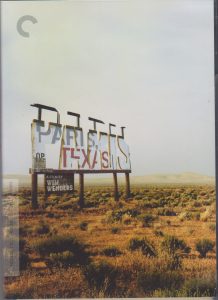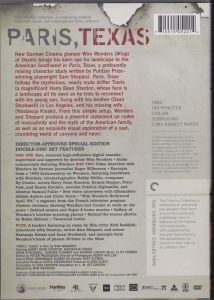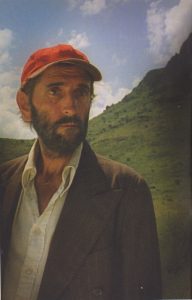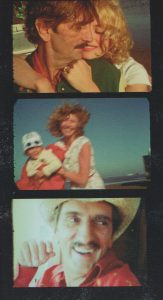(Criterion DVD, 2009)
In the middle of German director’s Paris, Texas (1984), we see a crazy man on a long pedway over a Los Angeles freeway screaming symbolic lines like “There will be no safety zone!” to the vehicles passing by. Travis, a ‘lost’ person himself, walks past him, pats him and keeps moving on his own symbolic trek to Houston.
This is a movie about a man who majorly ‘screwed up’ his life with his wife and son and abandoned them when he couldn’t face up to his responsibility and role in a family break-up. The second part of the movie is about Travis’s search, with his son Hunter, for his wife Jane, herself troubled and lost, and his attempt to heal the family tragic alienation.
When the movie opens, memorably, on a wide-open Texas desert, we encounter a man in a suit and ball cap wandering until he collapses, and is eventually revived by an unscrupulous doctor who sees a chance to make a buck by contacting the man’s brother Walt in Los Angeles for a reward.
Walt and Travis are reunited after a four-year absence and Walt brings Travis back home to recover and to get reacquainted with his interesting 7 year-old son Hunter. Eventually father and son agree to hit the road in a beat-up half-truck to find the mother back in Texas.
Enough of the bare-bones plot. The movie is basically a significant art film about Americana and, in particular, the West in all its symbolic natural and man-made images. Each scene is deliberately composed in cinematography by Robby Muller who brilliantly plays with the myriad colors of nature and man-made signs and scenes. So much of this film is simply atmosphere, a long moving painting, but with what affects on the viewer!
The spare, unintrusive, atmospheric music is, likewise, brilliantly, composed and played by the legendary Ry Cooder. It would be fair to say that the visuals and music perfectly capture the inner and external conflicts of all the various characters and scenes.
Harry Dean Stanton gives an outstanding muted, but expressive performance as the burned-out father who eventually focuses on and fulfills his mission to reunite all three characters (with a believable twist at the end).
Dean Stockwell was drawn out of retirement as a real-estate agent(!) to realistically play the supportive, though baffled brother. Throughout, he does right by his older brother.
Hunter Carson, the son of Hollywood’s ‘Kit’ Carson and Karen Black, is simply remarkable in his first acting role; he is a natural as the confused, but game-for-an-adventure son.
Walt’s wife Aurore Clement adds a tender foreign touch in her support of Travis and her love for Hunter, her adopted-by-default son.
The likable, devoted-to-her-son Jane is perfectly played by Natassja Kinski. She and Stanton are both moving in the unusual, unconventional climax written by Sam Shepard who was the co-originator of this movie with Wenders.
There are many powerful, beautiful scenes in this emotional and realistic movie. My favorite, though, would have to be Walt’s family’s nostalgia Super 8 viewing of both couples in better times before the ‘fall’ and separation. It forms the core, archetypally, of what happiness in male-female and parent-child relationships looks and feels like.
Paris, Texas is likely like no other American-made movie you’ve seen before. The viewer simply goes along for the ride and shares vicariously in all characters’ feelings and conflicts. Like Wenders’ other classic Wings of Desire (1987), it remains a film masterpiece as well as a positive work of art about how necessary reconciliation can happen despite many obstacles, doubts, and very long odds.




